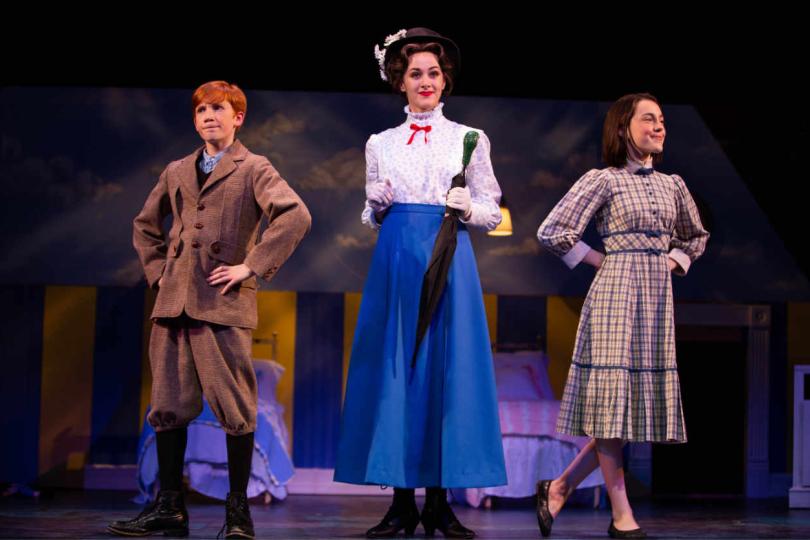“Someone’s up your chimney and it isn’t Santa Claus”

If you are like me, when you think of Mary Poppins™, you imagine a smiling and charming Julie Andrews with sweet, slightly naughty children and absent but caring parents. Julian Fellowes’ adaptation of the classic movie puts a much darker spin on the story. Instead of a lively but absent suffragette mother, he has created a homebound former-actress (no doubt to increase the social tension between her and her husband and his ideal life); instead of a rather silly and stilted father, the specter of Mr. Banks’ former (abusive) nanny continues to impact his ability to form meaningful attachments to his family. The Banks’ marriage is clearly on the rocks.
Of course, a play like this cannot function without a brilliant titular actor, and Becca Hart does an amazing job with the role of Mary Poppins. Her voice is lovely, and her brisk walk coupled with an excellent English accent leave no room to doubt her command. Hart also introduces a slightly darker dynamic to the play -- she is just a touch harder, still beautiful and young, but perhaps not quite as human as Andrew’s version. Her charges Jane and Michael Banks (played by both Kate Regan/Mabel Weismann and Josh Bagley/Liam Beck-O’Sullivan) are also more wild and willful than they are in the movie. It is here that I think the children in the audience will see more of themselves within these characters-- Jane and Michael are more of young adolescents than children and not quite as naive. In the production I saw, Kate Regan and Josh Bagley did a superb job. Their pitch while singing and acting were all very good. In particular, although Bagley’s mic had many technical difficulties during the production, he came through with very adult aplomb and perseverance. The show must go on!
Stage Magic
Without the ability to utilize animations for some of the more fantastical elements of the Disney original, a good deal of the plot that moves us from Sherman brothers’ song to Sherman brothers’ song has changed in Fellowes’ adaptation. The musical takes us to places such as the Conversation Shop (where we get “Supercalifragilisticexpialidocious”), and adds numbers such as “Brimstone and Treacle” and the deeply disturbing “Playing the Game.” Seriously, I have no idea why this scene exists, but it is completely uncalled for. It feels like a mix of Moulin Rouge’s “Roxanne” dance sequence mixed with Toy Story.
There is some fantastic stage magic through, just waiting to impress children and adults. Mary Poppins’ hat stand, a wonderful bit with cupboards that put themselves back together, and the large ensemble dance numbers might almost be considered magical in and of themselves. Joel Sass (director/scenic designer), Joe Chvala (choreographer), Ed Gleeman (costume designer), and Katie Phillips (properties designer) pull out all the stops for “Jolly Holiday.” The cast is a riot of color and dance, and every single young face in the audience couldn’t look away.
“Good for Nothing / Being Mrs. Banks”
For all that Artistry’s production is “practically perfect”, Fellowes’ script makes some interesting choices that deserve closer scrutiny. The original movie was released in 1964 and based on the work of P.L. Travers, and this adaptation cleaves more directly to the movie than to the original books. For those of us who loved (or loved to hate) Downton Abbey as well as a few of Fellowes’ other properties (I’m thinking The Young Victoria and Gosford Park in particular), some of his classic tropes are all too easy to recognize. His preoccupation with an upstairs/downstairs dynamic persists without the teeth to fully investigate it. There seems to be no deeper reflection on the plight of the small children chimney sweeps whose purpose is to do dirty jobs no one else wants and comfort other children. When Jane and Michael are upset by their middle-upper class lives, Mary Poppins whisks them to the roof so that a chorus of child laborers can reassure them:
[Mary Poppins]
Just remember when you're low
Feeling in the wars
Someone's up your chimney
[Chorus]
And it isn't Santa Claus
If you need us, if you don't
Doesn't make much odds
We'll be watching over you
This seems, to my mind, a strange lesson, and it feels like Fellowes should have done either more or less with it. In a similar vein, in the original version, Mrs. Banks is a silly but kind and highly devoted suffragette, who spends much of the movie agitating for votes and marching around the house. In the play, she is a sad, slightly lower-class housewife who spends most of her time wishing she could be more useful to her husband. While Andrea Wollenberg does a great job with the meager part, changing Mrs. Bank’s arc and titling her song “Good for Nothing / Being Mrs. Banks” all miss the mark. In trying to make her character more relatable (I guess) he has robbed her of her social potency. Also it feels worth mentioning that in Artistry’s production seemingly the only person of color (Brandon A. Jackson) in the main cast plays the villain. To be clear, Jackson is fantastic, and the role is perfect for him and his dynamic singing range, but it feels a bit glaring, and could probably have been resolved by casting some additional people of color.
In their playbill messages, Executive Director & Chief Advancement Officer Andrea Specht and Producing Artistic Director Benjamin McGovern both mention how important it is to them that families come to see this production. The love of live theatre is learned, and best inculcated with family and friends. This production will absolutely spark joy in families, but I also hope that it opens the doors for other conversations as well. Darkly comical and problematic in parts, I hope that this families go away and talk about the Banks’ marriage, the children chimney sweeps, and Bert’s constant advances on Mary Poppins (which feel very different in 2018 than they did in 1964). I hope they talk about the large social divide between the Banks and Bert/Bird Woman/Mrs. Brill and Ms. Andrew, and about how Mary Poppins is able to move between them.
I would highly recommend Mary Poppins at Artistry, which runs until November 4, 2018. It clocks in at almost 3 hours with intermission, so make sure to bring sweets for the kids!
In the originally published article, Brandon A. Jackson was incorrectly identified as Brandon A. Johnson. This has since been updated.




